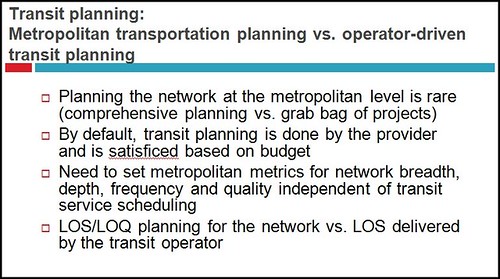Metropolitan mass transit planning: more thoughts

I wrote about this yesterday in the context of a Post article on Saturday about late night demand increasing for bus service on certain DC routes. Today's Post has a follow up article, "DC officials call for improved late-night bus service." about the WMATA Board's response.
From the article:
Metro is being urged to improve its late-night bus service in the District after a report that service-industry workers heading home after 10 p.m. are often left behind by overcrowded buses.
D.C. Council member Muriel Bowser, the city’s representative on the Washington Metropolitan Area Transit Authority’s Board of Directors, said she has asked transit officials to better monitor the bus schedules and add longer buses to the 16th Street routes, the city’s most crowded after 7 p.m.
Tom Downs, a vice chairman on the board, said the overcrowding, unreliable schedules and bus bunching on the routes reflect increasing demand for service systemwide.
“It is not just this corridor in the evening. We are having significant growth in bus ridership, and we need to know where and how and why that is happening, and we need to know how to respond to that over the next couple of years,” Downs said in an interview.
He said he has asked Metro to analyze where ridership is increasing and to hold focus groups. For the 16th Street buses, Downs said that in addition to expanded route monitoring and longer buses, he wants Metro to consider starting some northbound buses at P Street NW.
My first response is that this isn't what the Board should be doing, almost micro-managing, but they are right to step in, because of the continued failure to increase service. But that this isn't being done anyway, or at least the information isn't being acted upon, is an indicator of more serious problems.
In my presentation on Metropolitan Mass Transit Planning: Towards a Hierarchical and Conceptual Framework I make the point that standards and metrics and the general plan for network breadth, depth, level of quality and level of service need to be set by metropolitan transportation planning organizations independent of the transit operator.
At the same time, checks/evaluations on level of service, level of quality, etc., shouldn't be only conducted by the service provider, or at least, without the information being communicated to the metropolitan and jurisdictional transportation planners.
Basically, another point I'd add to that presentation is that part of the checks and balances should include regular LOS evaluation surveys/studies that are conducted by the metropolitan and jurisdictional transportation planning authorities independent of the transit operator.
Obviously, WMATA knows about the problem, they just haven't been dealing with it. By conducting the surveys of service quality and demand independently, it creates a more open environment focused on meeting the demand and standards.



1 Comments:
Nice post.
Visit here-online pharmacy usa.
Post a Comment
<< Home